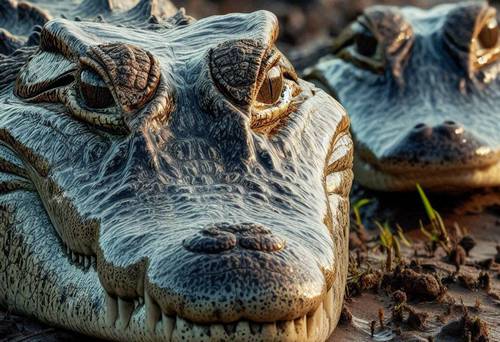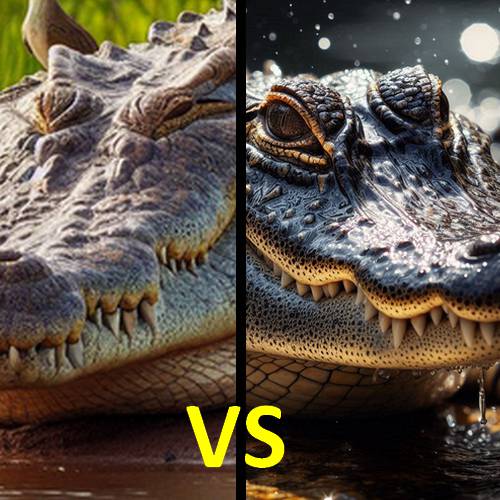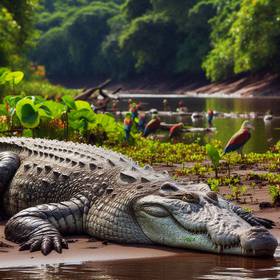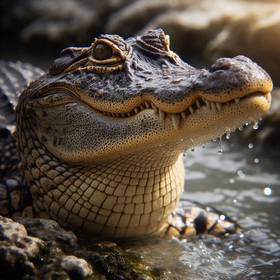Hey, ever wonder why your buddy's pet gator doesn't quite match up with those gnarly crocs you've seen on TV? Let's dive into the wild world of these scaly beasts over a virtual coffee, shall we?
The Differences in Behavior, Habitat, and Diet from Crocodile vs Alligator
Picture this: You're on a swamp tour in Florida, and your guide points out an alligator lounging in the sun. Now, imagine you're on a safari in Africa, and there's a crocodile eyeing you from the riverbank. Same thing, right? Not quite!
Behavior: The Chill Gator and the Cranky Croc
Alligators are like that laid-back friend who's always down to Netflix and chill. They're generally pretty chill unless you mess with their turf. Crocodiles, on the other hand? They're more like that friend who's always itching for a bar fight. They've got a shorter fuse and a meaner bite.
Remember that time your cat hissed at you for no reason? That's a crocodile on a good day. An alligator is more like a grumpy old dog – it might growl, but it's probably just telling you to get off its lawn.
Diet: Picky Eaters vs. Garbage Disposals
Alligators are like your friend who always orders chicken nuggets. They stick to fish, turtles, and small mammals. Crocodiles? They're the ones who'll eat anything on the menu, including the menu itself. They're not afraid to take on bigger prey like zebras or wildebeest.
Imagine you're at a buffet. The alligator fills its plate with familiar foods, while the crocodile is piling on a bit of everything, including stuff you can't even identify.
So, next time you're watching a nature doc or visiting a zoo, you'll be the smart cookie who can spot the difference. Just remember: if it looks grumpy and is in salt water, it's probably a croc. If it's lounging in a freshwater swamp looking unbothered, you've likely spotted a gator. And if you're close enough to check its teeth, well... maybe it's time to back away slowly!
Physical Appearance: Crocodile vs. Alligator - Spot the Difference!
Let's play a little game of "spot the difference", reptile edition:
• Snout Shape: Alligators and crocodiles, while similar, have evolved distinct snout shapes that reflect their different hunting strategies. The alligator's wider, U-shaped snout is a powerhouse designed for crushing.
This broader structure houses strong jaw muscles and robust teeth, perfect for crunching through turtle shells or the bones of larger prey. It's like nature's version of a nutcracker - built for brute force.
On the flip side, crocodiles sport a longer, V-shaped snout that's all about precision. This narrower design allows for quick sideways head movements in water, ideal for snagging fish. The pointed shape also helps them tear chunks from larger prey or scavenged carcasses. Think of it as a biological Swiss Army knife - versatile and sharp.
These snout differences highlight how these ancient reptiles have adapted to thrive in their respective environments, showcasing nature's knack for specialized design.
• Toothy Clues: When a crocodile closes its mouth, you can still see its bottom teeth sticking out, like a mischievous grin. An alligator's lower teeth, on the other hand, are hidden behind its upper teeth when its mouth is closed. It's like they're better at hiding their snacks!
• Size and Color: Crocodiles tend to be larger and darker than alligators. However, size and color can vary depending on the specific species and their environment. Think of it like telling the difference between a Great Dane and a Labrador - both dogs, but with different looks!
The Differences in Behavior, Habitat, and Diet from Crocodile vs Alligator
Picture this: You're on a swamp tour in Florida, and your guide points out an alligator lounging in the sun. Now, imagine you're on a safari in Africa, and there's a crocodile eyeing you from the riverbank. Same thing, right? Not quite!
Behavior: The Chill Gator and the Cranky Croc
Alligators are like that laid-back friend who's always down to Netflix and chill. They're generally pretty chill unless you mess with their turf. Crocodiles, on the other hand? They're more like that friend who's always itching for a bar fight. They've got a shorter fuse and a meaner bite.
Remember that time your cat hissed at you for no reason? That's a crocodile on a good day. An alligator is more like a grumpy old dog – it might growl, but it's probably just telling you to get off its lawn.
Diet: Picky Eaters vs. Garbage Disposals
Alligators are like your friend who always orders chicken nuggets. They stick to fish, turtles, and small mammals. Crocodiles? They're the ones who'll eat anything on the menu, including the menu itself. They're not afraid to take on bigger prey like zebras or wildebeest.
Imagine you're at a buffet. The alligator fills its plate with familiar foods, while the crocodile is piling on a bit of everything, including stuff you can't even identify.
So, next time you're watching a nature doc or visiting a zoo, you'll be the smart cookie who can spot the difference. Just remember: if it looks grumpy and is in salt water, it's probably a croc. If it's lounging in a freshwater swamp looking unbothered, you've likely spotted a gator. And if you're close enough to check its teeth, well... maybe it's time to back away slowly!
Physical Appearance: Crocodile vs. Alligator - Spot the Difference!
Let's play a little game of "spot the difference", reptile edition:
• Snout Shape: Alligators and crocodiles, while similar, have evolved distinct snout shapes that reflect their different hunting strategies. The alligator's wider, U-shaped snout is a powerhouse designed for crushing.
This broader structure houses strong jaw muscles and robust teeth, perfect for crunching through turtle shells or the bones of larger prey. It's like nature's version of a nutcracker - built for brute force.
On the flip side, crocodiles sport a longer, V-shaped snout that's all about precision. This narrower design allows for quick sideways head movements in water, ideal for snagging fish. The pointed shape also helps them tear chunks from larger prey or scavenged carcasses. Think of it as a biological Swiss Army knife - versatile and sharp.
These snout differences highlight how these ancient reptiles have adapted to thrive in their respective environments, showcasing nature's knack for specialized design.
• Toothy Clues: When a crocodile closes its mouth, you can still see its bottom teeth sticking out, like a mischievous grin. An alligator's lower teeth, on the other hand, are hidden behind its upper teeth when its mouth is closed. It's like they're better at hiding their snacks!
• Size and Color: Crocodiles tend to be larger and darker than alligators. However, size and color can vary depending on the specific species and their environment. Think of it like telling the difference between a Great Dane and a Labrador - both dogs, but with different looks!





